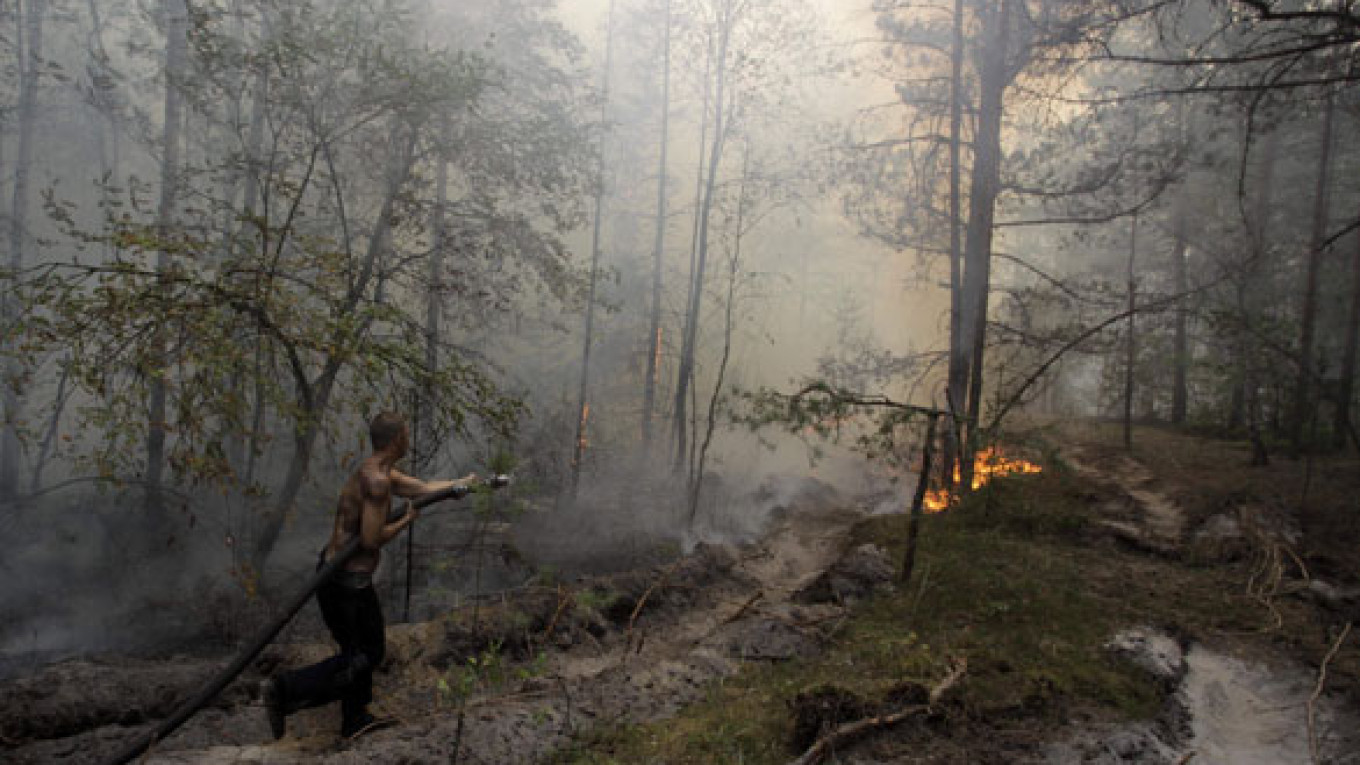Despite the thousands of homes destroyed by fires raging throughout central Russia, insurance firms are weathering the disaster as few homes are insured and even fewer claims are made for damaged property.
There are 831 registered focal points of the forest fires, the Emergency Situations Ministry said Friday. More than 3,000 people have lost their homes and property, and about 2,000 dwellings have been burned down.
The government has promised to compensate every fire victim with 3 million rubles ($100,700), of which 2 million will go toward rebuilding his home and 1 million to infrastructure. About 5 billion rubles have been earmarked from the federal budget for this. And if every victim can count on these payments, then fewer victims will get additional compensation from insurance companies. Insurance payouts are smaller anyway — the average claim for a real estate policy in 2009 was 500,000 rubles ($16,800).
Only 7 percent of Russians insure their homes, and only 2 percent get policies for dachas, according to a poll conducted by VTsIOM in September 2009.
Of the 60 million homes and apartments in Russia, 8 million are insured, according to Alexei Zubets, head of Rosgosstrakh's center for strategic research. But the scope of coverage varies highly by region.
For example, in the Moscow region and in Tatarstan, real estate insurance coverage is 26 percent and 24 percent, respectively, while 9 percent of the homes in the Volgograd region are insured, 12 percent in Nizhny Novgorod and 9 percent in Rostov-on-Don, Zubets said.
Rosgosstrakh, by its own estimates, has a third of the market share, while Rosno has 8 percent and Reso-Garanti — 7 percent. Rosgosstrakh's share on the market for low-cost homes and dachas is as high as 80 percent, said Pavel Samiyev, deputy head of the Expert rating agency.
About 800 structures insured by Rosgosstrakh burned in fires in the Central and Volga federal districts, but no more than one-third of them managed to file a claim, a company spokesperson said.
The total damages, according to preliminary data, are estimated at about 200 million rubles.
The biggest compensation payments are in the Nizhny Novgorod region. The regional center for claims settlements has already accepted 130 claims, and the listed damage amounts have reached 50 million rubles. The first claims were made last weekend.
At the beginning of August, Rosgosstrakh introduced a simplified system for settling claims for the fire victims — they must present their original policies, and the Emergency Situations Ministry's database is used to confirm eligibility. Insurer VSK has had such a system since July.
Even fewer claims have been received by other insurers.
"We have so far received only three claims from the forest fires: from the Nizhny Novgorod region, the Ryazan region and the Moscow region for 2 million rubles," said Artyom Iskra, director of Rosno's consumer insurance department.
Iskra has noticed an increased interest from clients in insuring their dachas. Demand for insuring property in many regions has increased, the Rosgosstrakh spokesperson said.
The fires are localized in a few regions, and not nearly all of the buildings in these regions are insured. Most of the risks are concentrated on Rosgosstrakh's books, therefore the situation is unlikely to strongly affect the loss ratio of the market, Samiyev said. The loss ratio of the whole market may rise 1 percent to 2 percent, while Rosgosstrakh may see a 3 percent to 5 percent rise.
Rosgosstrakh's weekly claims payments are about 1.2 billion rubles — the number is large, but against regular premium collections it can be considered a seasonal deviation, so it is unlikely to affect its financial indicators, the company's spokesperson said.
Agriculture claims may have a bigger effect on the loss ratio of the insurance market, Samiyev said. Insurers so far have not paid anything for these claims, and it will only be possible to evaluate their losses in the fall.
A Message from The Moscow Times:
Dear readers,
We are facing unprecedented challenges. Russia's Prosecutor General's Office has designated The Moscow Times as an "undesirable" organization, criminalizing our work and putting our staff at risk of prosecution. This follows our earlier unjust labeling as a "foreign agent."
These actions are direct attempts to silence independent journalism in Russia. The authorities claim our work "discredits the decisions of the Russian leadership." We see things differently: we strive to provide accurate, unbiased reporting on Russia.
We, the journalists of The Moscow Times, refuse to be silenced. But to continue our work, we need your help.
Your support, no matter how small, makes a world of difference. If you can, please support us monthly starting from just $2. It's quick to set up, and every contribution makes a significant impact.
By supporting The Moscow Times, you're defending open, independent journalism in the face of repression. Thank you for standing with us.
Remind me later.


